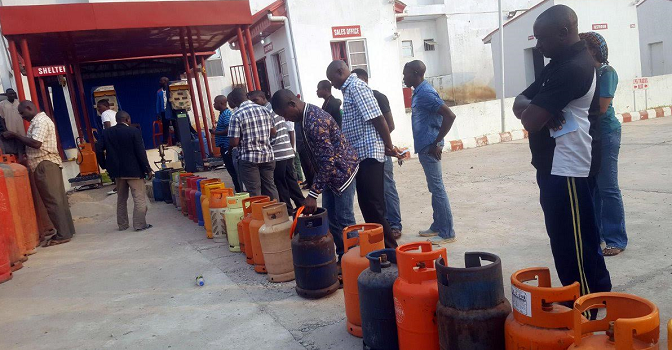The National Bureau of Statistics (NBS) has revealed that residents of nine Nigerian states collectively spent N312.27 billion on cooking gas in the third quarter of 2024. This figure highlights the increasing reliance on Liquefied Petroleum Gas (LPG) as a primary energy source for households, driven by government policies promoting cleaner energy and reducing dependence on firewood and kerosene.
Breakdown of Expenditures
The NBS report detailed the cooking gas consumption expenditures across these nine states, with Lagos, Rivers, and Kano emerging as the top spenders. These states accounted for a significant portion of the overall expenditure due to their large population sizes, urbanization rates, and higher levels of disposable income.
Lagos State, as expected, led the spending chart with residents spending N74.85 billion on LPG in the period under review. The state’s high consumption rate is largely attributed to its dense population, urbanization, and increased awareness of cleaner energy options. Rivers State followed with N55.63 billion, driven by its status as an industrial hub and a major oil-producing state, which translates to greater access to energy resources. Kano, one of Nigeria’s most populous states, came in third with N48.74 billion.

Other states that contributed significantly to the total expenditure included Oyo, Delta, Ogun, Kaduna, Edo, and Anambra. The rising trend of LPG consumption across these states signals the gradual shift towards cleaner energy solutions, even in areas with lower incomes and less urbanization.
### Government Policies Driving LPG Adoption
The Nigerian government has implemented various initiatives aimed at encouraging the use of LPG as a clean and affordable alternative to traditional fuels like firewood and kerosene. These efforts have been part of broader policies to reduce deforestation, improve health outcomes by minimizing indoor air pollution, and align with global sustainability goals.
Programs such as the National LPG Expansion Implementation Plan have been critical in driving the adoption of cooking gas in households. Through collaborations with private sector players, the government has worked to improve the supply and distribution networks for LPG, making it more accessible and affordable for the average Nigerian.
Subsidies, incentives, and partnerships with private firms have also played a crucial role in encouraging households to switch to LPG. These initiatives aim to reduce the financial burden on low-income earners while promoting the benefits of cleaner energy.
### Challenges in the Cooking Gas Market
Despite the increase in LPG usage, several challenges continue to hinder widespread adoption across the country. One of the primary challenges is the fluctuating cost of cooking gas, which remains a concern for many households. Prices for LPG have been volatile due to changes in global oil prices, supply chain disruptions, and foreign exchange issues, making it difficult for consumers to maintain a consistent usage pattern.
Many rural areas in Nigeria still rely heavily on firewood and charcoal for cooking due to the lower upfront costs, even though these fuels are less efficient and more harmful to health and the environment. The infrastructure required to distribute LPG to these areas is often underdeveloped, leading to uneven access to clean energy across the country.
In addition, there are concerns about the safety of LPG cylinders, particularly in areas where there is inadequate regulation or inspection. Explosions and gas leaks from poorly maintained cylinders have led to fatal accidents, deterring some households from making the switch to cooking gas.
### Efforts to Address Challenges
The federal government, in partnership with the private sector, has been working to address these challenges. Efforts are underway to stabilize cooking gas prices through better regulation of the market, and to ensure a steady supply of LPG by enhancing local production capacity. Additionally, the government has been promoting the domestication of LPG cylinder production to ensure that affordable and safe cylinders are available to consumers.
The government is also investing in expanding LPG distribution infrastructure, particularly in rural areas, where access to cooking gas remains limited. This includes the establishment of micro-distribution centres (MDCs) and retail outlets closer to households to reduce transportation costs and improve supply reliability.
### Benefits of LPG Adoption
The increasing use of cooking gas has several economic, environmental, and health benefits for Nigeria. Economically, it reduces the amount of foreign exchange spent on importing kerosene and other traditional fuels. As local production of LPG increases, the reliance on imports will decrease, boosting Nigeria’s energy independence.
Environmentally, the use of LPG reduces the deforestation associated with the widespread use of firewood for cooking. Nigeria has one of the highest rates of deforestation globally, driven largely by the need for firewood. Promoting the use of LPG can help to preserve the country’s forests, reducing carbon emissions and mitigating climate change.
From a health perspective, the adoption of LPG helps reduce the harmful effects of indoor air pollution, which is a leading cause of respiratory diseases, particularly among women and children in rural areas who are most exposed to smoke from firewood and charcoal.
Conclusion
The N312.27 billion spent on cooking gas by residents of nine states in Nigeria during the third quarter of 2024 reflects a growing shift towards cleaner energy solutions in the country. While challenges remain in terms of price volatility, infrastructure, and safety, the government’s continued push for LPG adoption is yielding positive results.
As more Nigerians embrace cooking gas, the country stands to benefit from improved public health, environmental sustainability, and economic resilience. With the right policies and investments in place, the potential for LPG to become the dominant energy source for cooking in Nigerian households is within reach.
Support InfoStride News' Credible Journalism: Only credible journalism can guarantee a fair, accountable and transparent society, including democracy and government. It involves a lot of efforts and money. We need your support. Click here to Donate
